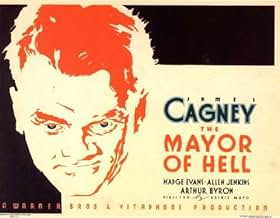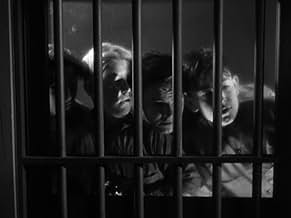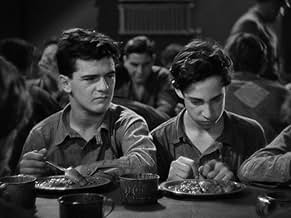Añade un argumento en tu idiomaA political appointee with a checkered past tries to institute constructive changes as the deputy commissioner at a cruel reform school but gets pushback from a sadistic warden and a suspici... Leer todoA political appointee with a checkered past tries to institute constructive changes as the deputy commissioner at a cruel reform school but gets pushback from a sadistic warden and a suspicious judge who doesn't trust his motives.A political appointee with a checkered past tries to institute constructive changes as the deputy commissioner at a cruel reform school but gets pushback from a sadistic warden and a suspicious judge who doesn't trust his motives.
- Dirección
- Guión
- Reparto principal
- Premios
- 2 premios en total
- Smoke
- (as Farina)
- Brandon
- (as George Pat Collins)
Reseñas destacadas
Some good scenes, such as the regimented mess hall with its robotic commands and synchronized quick-step. Also, the movie really comes alive during the well-staged riot scene. The raging mob, flickering shadows and wildly burning torches create a disturbingly hellish scene befitting the title. Still, unless I missed something, the mob really is responsible for the cruel Dudley Digges death, allowing the boys to get away with murder or at least manslaughter no matter how much Digges deserves it. This may be an example of justice prevailing over the law during those pre-code days.
Showing how closely the school's operation is tied to greedy political patronage provides an interesting touch. Nonetheless, Cagney's conversion from corrupt ward healer to the George Washington of a boy's republic remains something of a stretch. And I'm sure the stereotype of the Jewish kid may have brought some chuckles in that day, but not in this post-holocaust period. Then too, the black kid's dad may be a crude stereotype, but the boy isn't, participating importantly in republic activities. Notice how subtly his role emerges, probably so as not to offend some audiences. Still, it was a nervy move for the time. Notice also, how deglamorized the boys are. With the many shapes and sizes, they look as though they were recruited off the streets-- another nice touch.
As in most Warner Bros. pictures of the time, there's an atmosphere of New Deal reform, embodied here by the understanding judge who's willing to try unorthodox methods to remedy social ills. All in all, the film stands as an entertaining period piece, with a humane message that stands the test of time.
This is Cagney playing his good guy gangster. It's solid. The kids are solid pre-Dead End Kids. The morality is pretty simple. My only complaint is nurse Dorothy would never quit. She needs to be outright fired and be carried out kicking and screaming. She's basically abandoning the boys. The guard who gives the boy his coat should be replaced with Dorothy. Patsy's call to Thompson should be replaced with a call to Dorothy. That way the story could still end the same way. This is a very simple moral gangster film.
It takes the entrance of Cagney to change things around, an ex- gangster who has been deputized to help run things at the reformatory and who sympathizes with the plights of the boys, especially Darro who reminds him of his own tough days as a street punk. JAMES CAGNEY puts all of his usual energy into the role of the do-gooder who changes things around, along with cooperative Nurse Griffith (MADGE EVANS), and is there when the going gets tough and things revert back to their nasty ways during his brief absence.
The last half-hour of the film gets a little too melodramatic as the kids take matters into their own hands after the warden causes the death of one of their fellow inmates. There's a climactic scene where they put him on trial. When he escapes their clutches by jumping out a window, a chase follows and a barn is burned down forcing him to jump to his death. The plot contrivances that follow are hard to swallow, but for Jimmy and Madge Evans at least there's a happy ending.
ALLEN JENKINS is a welcome presence for comic relief but the tone of the film borders on heavy prison melodrama almost all the way.
DUDLEY DIGGES plays the unsympathetic role of the sadistic warden fairly well, but I still think of him as the befuddled detective who has a hard time pinning down RAFFLES (Ronald Colman) in that Scotland Yard yarn.
For Cagney fans, this is a glimpse of him at his talented best in an early role. Archie Mayo directs the project in his brisk, no nonsense Warner style.
*** (out of 4)
James Cagney plays a crime boss who uses his power to get a "real" job working in a boys reformatory school. At first he doesn't take the job too serious but then he sees how the boys are mistreated so he takes over running the school and tries to turn it into something good. This film was remade twice in the next six years with Crime School and Hell's Kitchen and while both of those films were very entertaining there's no question this is the best of the three versions. One thing that helps is the fact that this one was made before the code came into play so it has a lot more of a raw feel to it whereas the remakes were toned down in content. Another added bonus is seeing Cagney who once again delivers a strong performance. He doesn't show up until the twenty-five minute mark and it speaks well of the young actors who hold the film up before the star gets on screen. The supporting players all do fine work with Madge Evans as the love interest, Allen Jenkins as Cagney's sidekick and Dudley Digges as the bad guy running the school. I think one fatal flaw is the ending and the aftermath. The ending turns into a Frankenstein type setting, which might have worked but the aftermath is so rushed and faked that it really ends the film on a sour note. Outside of that this is a pretty good drama with its heart in the right place and the toughness you'd expect from a Warner/Cagney film.
¿Sabías que...?
- CuriosidadesJimmy and his gang go into a tobacco shop, and he orders some "Navy Twist" for his "old man." Also known as Navy tobacco, Navy cut, and Navy flake, the tobacco is twisted into a roll. For smoking, a slice (called a "twist" or "curly") is cut off and used in a pipe or sometimes to make a cigarette. Eventually, all twisted or pressed tobacco was called "Navy."
- PifiasWhen Dorothy goes into her office and locks Patsy out, there is a table outside the door on which four books are resting. In the next shot, a closeup of the table top, there are only two books.
- Citas
Lawyer: Tell us what you know, I said! Never mind what you think!
Mr. Hemingway: Excuse me, boss. I ain't no lawyer. I can't talk without thinkin'.
Selecciones populares
- How long is The Mayor of Hell?Con tecnología de Alexa
Detalles
Taquilla
- Presupuesto
- 229.000 US$ (estimación)
- Duración
- 1h 30min(90 min)
- Color
- Mezcla de sonido
- Relación de aspecto
- 1.37 : 1




























